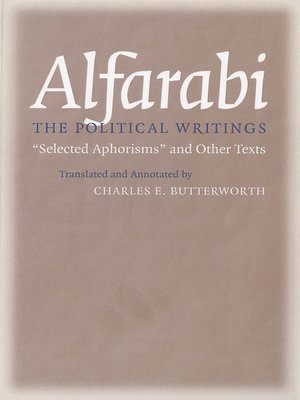
Sign up to save your library
With an OverDrive account, you can save your favorite libraries for at-a-glance information about availability. Find out more about OverDrive accounts.
Find this title in Libby, the library reading app by OverDrive.



Search for a digital library with this title
Title found at these libraries:
| Loading... |
Alfarabi was among the first to explore the tensions between the philosophy of classical Greece and that of Islam, as well as of religion generally. His writings, extraordinary in their breadth and deep learning, have had a profound impact on Islamic and Jewish philosophy. This volume presents four of Alfarabi's most important texts, making his political thought available to classicists, medievalists, and scholars of religion and Byzantine and Middle Eastern studies.
In a clear prose translation by Charles E. Butterworth, these treatises provide a valuable introduction to the teachings of Alfarabi and to the development of Islamic political philosophy. All of these texts are based on new Arabic editions. Two—The Book of Religion and Harmonization of the Two Opinions of the Two Sages, Plato the Divine and Aristotle—appear in English for the first time. The translations of the other two works—Selected Aphorisms and chapter five of the Enumeration of the Sciences—differ markedly from those previously known to English-language readers.
Butterworth situates each essay in its historical, literary, and philosophical context. His notes help the reader follow Alfarabi's text and identify persons, places, and events. English-Arabic and Arabic-English glossaries of terms further assist the reader.
|Alfarabi (ca. 870–950) founded the great tradition of Aristotelian/Platonic political philosophy in medieval Islamic and Arabic culture. In this second volume of political writings, Charles E. Butterworth presents translations of Alfarabi's Political Regime and Summary of Plato's "Laws" , accompanied by introductions that discuss the background for each work and explore its teaching. In addition, the texts are carefully annotated to aid the reader in following Alfarabi's argument. An Arabic-English/English-Arabic glossary allows interested readers to verify the way particular words are translated. Throughout, Butterworth's method is to translate consistently the same Arabic word by the same English word, rendering Alfarabi's style in an unusually faithful and yet approachable manner.Political Regime consists of two parts. One focuses on nature and natural existing things as well as the principles beyond nature that guide the existing things. In the second part, the exposition centers on human beings and their place in the larger cosmic whole as well as on how a proper organization of human life in political association provides the conditions whereby human beings might achieve their purpose.Summary of Plato's "Laws" gives an account of the first nine books of Plato's Laws. Alfarabi explains Plato's art of writing in general and the method he follows in writing the Laws in particular. Unlike Alfarabi's other works, which examine the place of legislation and laws in the broader context of political philosophy, the Summary is a more specialized study of the question of laws and how and why they are formulated, with a particular focus on the relevance of Plato's investigation concerning Greek divine laws for the study and understanding of all divine laws.
|Alfarabi was among the first to explore the tensions between the philosophy of classical Greece and that of Islam, as well as of religion generally. His writings, extraordinary in their breadth and deep learning, have had a profound impact on Islamic and Jewish philosophy.This volume presents four of Alfarabi's most important texts, making his political thought available to classicists, medievalists, and scholars of religion and Byzantine and Middle Eastern studies. In a clear prose translation by Charles E....






